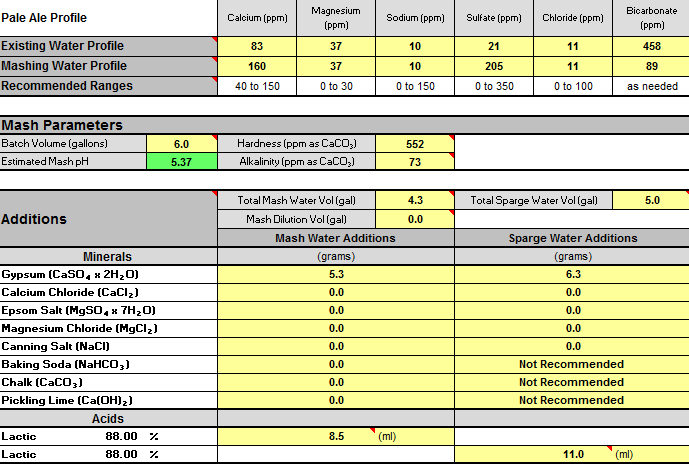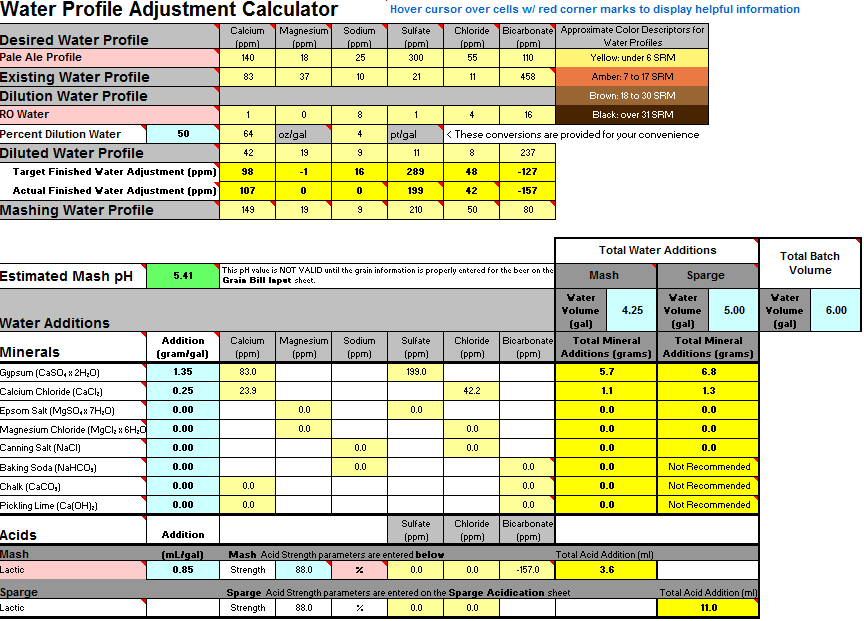TeamAshBrewing
Well-Known Member
Hello all, I moved into a new house a few batches ago and all of those beers have had a harsh bitterness and under achieving hop profile. I am pretty sure its the water thats causing it, so I have been digging into adjusting the water. I got my ward water report back and have a few questions.
pH 7.9
Total Dissolved Solids (TDS) Est, ppm 396
Electrical Conductivity, mmho/cm 0.66
Cations / Anions, me/L 7.7 / 8.3
Sodium, Na 10
Potassium, K 3
Calcium, Ca 83
Magnesium, Mg 37
Total Hardness, CaCO3 362
Nitrate, NO3-N 0.2 (SAFE)
Sulfate, SO4-S 7
Chloride, Cl 11
Carbonate, CO3 < 1.0
Bicarbonate, HCO3 458
Total Alkalinity, CaCO3 378
Total Phosphorus, P 0.35
Total Iron, Fe < 0.01
Im brewing a 6 gallon batch pale ale with
11 lbs Pale
12 oz Crystal 40
8 oz Carapils
4.25 gals Mash water
5 gals sparge water
I plugged all of that info into BruN water, chose the Pale Ale Profile, and came up with the following summary.
Am I on the right track here? Should I dilute with RO water to bring down the MG level, and add more additions to bring the other levels back up? Do I measure and adjust the mash water, and then start over with the sparge water, or just measure and combine the entire 9.25 gals and 11.6g of gypsum? Any other helpful hints would be appreciated. Thanks

pH 7.9
Total Dissolved Solids (TDS) Est, ppm 396
Electrical Conductivity, mmho/cm 0.66
Cations / Anions, me/L 7.7 / 8.3
Sodium, Na 10
Potassium, K 3
Calcium, Ca 83
Magnesium, Mg 37
Total Hardness, CaCO3 362
Nitrate, NO3-N 0.2 (SAFE)
Sulfate, SO4-S 7
Chloride, Cl 11
Carbonate, CO3 < 1.0
Bicarbonate, HCO3 458
Total Alkalinity, CaCO3 378
Total Phosphorus, P 0.35
Total Iron, Fe < 0.01
Im brewing a 6 gallon batch pale ale with
11 lbs Pale
12 oz Crystal 40
8 oz Carapils
4.25 gals Mash water
5 gals sparge water
I plugged all of that info into BruN water, chose the Pale Ale Profile, and came up with the following summary.
Am I on the right track here? Should I dilute with RO water to bring down the MG level, and add more additions to bring the other levels back up? Do I measure and adjust the mash water, and then start over with the sparge water, or just measure and combine the entire 9.25 gals and 11.6g of gypsum? Any other helpful hints would be appreciated. Thanks










































![Craft A Brew - Safale S-04 Dry Yeast - Fermentis - English Ale Dry Yeast - For English and American Ales and Hard Apple Ciders - Ingredients for Home Brewing - Beer Making Supplies - [1 Pack]](https://m.media-amazon.com/images/I/41fVGNh6JfL._SL500_.jpg)





